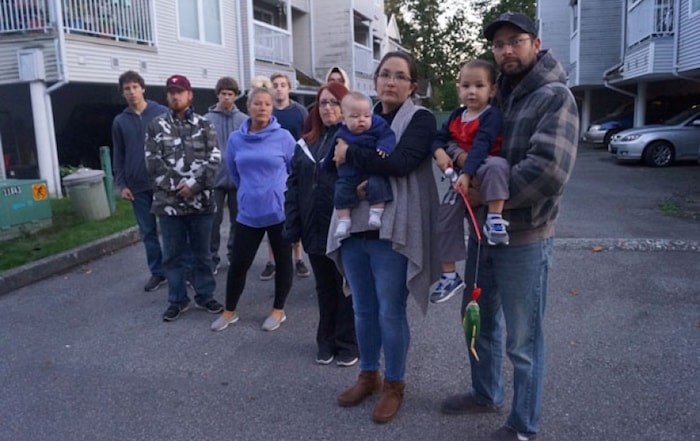A social housing advocate from Delta, who has recently launched a class-action lawsuit against BC Housing, says she’s disappointed an audit of the government operator made public by the provincial government only examined one partner provider — that of Atira Women’s Resource Society.
Elizabeth Zbitnoff says she was hoping for more to come out of Monday's release of the Ernst and Young forensic audit.
“As soon as I watched the media release, I said to myself, ‘What about the rest of the non-profits? From my understanding, that’s what the forensic audit was supposed to be on, not just Atira. I’m not surprised to see they kept it limited — just my honest opinion,” said Zbitnoff.
The Ladner resident says the findings of conflict of interest between Atira and former BC Housing CEO Shayne Ramsay “goes to the bigger problem” — that being systemic mismanagement of social housing units, including her own.
Glacier Media reached out to BC Housing for comment but did not hear back by publication.
Zbitnoff is one of a dwindling number of residents of Ladner Willows, a townhouse complex that provides subsidized housing to low and moderate income-earning people, as well as those with disabilities.
The reason why it’s a dwindling number is because the 40-unit complex fell into disrepair, she told Glacier Media.
“It started to become where someone would move out and they didn’t re-rent it,” said Zbitnoff, who claims there was “purposeful neglect” on the part of BC Housing-appointed non-profit housing provider Red Door Housing, starting in the 2010s.
“When I moved in (in 2007) the place was completely re-done and brand new; the outside was impeccable. Power washing, you name it,” said Zbitnoff.
But then, she claims, “everything stopped being maintained” and by 2018 numerous units were overcome with mould.
And so, the housing provider applied to re-develop the site. The application , as City of Delta councillors heard of concerns about how the provider had maintained the previous units and problems with evictions and re-locating residents.
“There was a lack of transparency,” said Zbitnoff.
The proposal was to build a 150-unit apartment of non-market housing.
Zbitnoff asserts BC Housing benefits from such proposals because the additional units (which provide lesser subsidies) are used to subsidize replacements of the existing ones. And opponents such as her argue that through the process, residents face evictions, lose ground-level and family-sized living spaces and there’s no additional “deep subsidy” units added to the stock.
“Only 20 per cent of this redevelopment was guaranteed as a deep core subsidy,” said Zbitnoff.
“The reason being, for redevelopment, is to ensure the providers could be self-sufficient in the long run and they (government) wouldn’t have to provide as many subsidies,” said Zbitnoff.
Ernst and Young did publish a review of BC Housing "financial systems" in May 2022. It found “BC Housing has more repair projects in the pipeline than it has funding for” and that there is “risk that funds allocated will be insufficient to maintain the housing stock at an acceptable [Facility Condition Index] resulting in un-liveable or poor-quality housing for residents.”
All in all, Zbitnoff and fellow Red Door Housing tenant Janna Martin, found a law firm to launch a class-action lawsuit against BC Housing, Red Door Housing and cities where the provider operates.
“At all material times, BC Housing knew or ought to have known the Properties suffered from severe deficiencies …which made it unsafe, unhealthy and unfit for habitation, as a result of the age of the structure and years of neglect,” the claim states.
The claim names as defendants the municipalities of Delta, Surrey, Coquitlam, Vancouver, Burnaby, Maple Ridge and Port Coquitlam, as they are allegedly responsible for the enforcement of bylaws regarding health and safety of buildings.
The claim alleges “systemic failures” on the part of the defendants, which underscores the class-wide basis of the claim.
Deficiencies Zbitnoff and Martin are claiming include: chronic verminous infestations; lack of heat, hot water and other basic amenities; growth of toxic mould; unsafe electrical wiring; unsafe plumbing; and deficiencies such as holes in walls, floors, ceilings and broken windows.
When Glacier Media contacted Red Door Housing for an opportunity to comment, a manager said their lawyer was unaware of the claim and has yet to have an opportunity to respond.
According to Zbitnoff, their lawyers Rakinder Sahota and Patrick Dudding have yet to serve the defendants since the claim was filed in BC Supreme Court March 17 in Victoria.
When Red Door Housing launched its application for redevelopment of Ladner Willows in 2018 and faced the same criticisms, the non-profit claimed it had done mould remediation; however, the complex was part of the leaky condo crisis of the early 1990s. The non-profit also stated funding to maintain the units had been inadequate for the past 15 years.
Correction: An earlier version of this story incorrectly stated that Janna Martin was Elizabeth Zbitnoff's neighbour.



